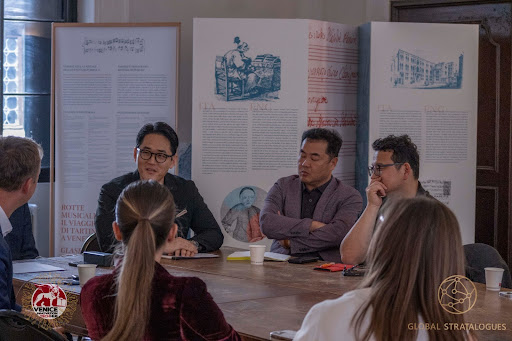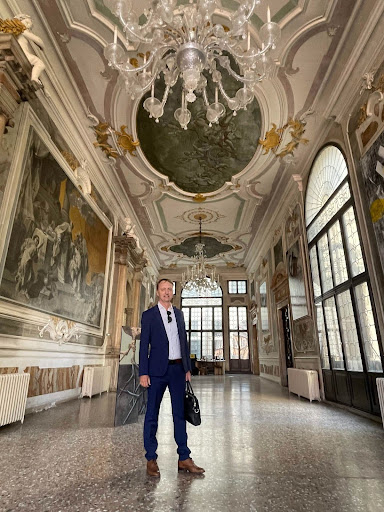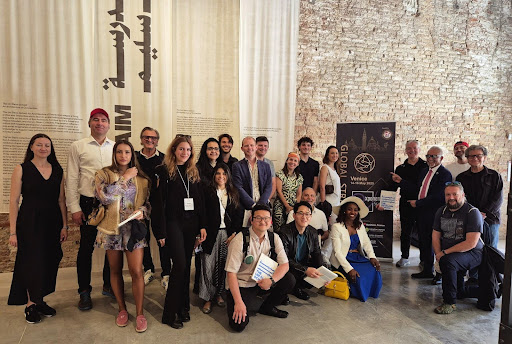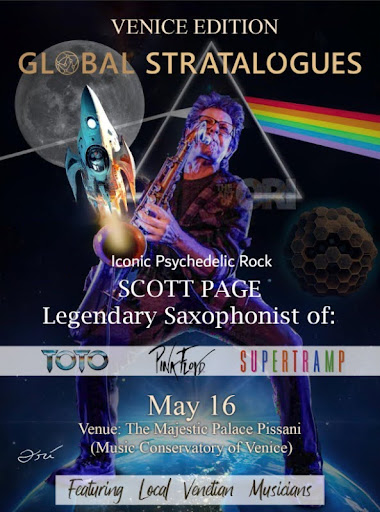When Culture Meets Code: Global Stratalogues Venice on K-Pop, Studios, and the Tech Revolution in Entertainment
In a media landscape shaped by instant virality, decentralized content, and hyper-niche audiences, the rise of Korean entertainment may be one of the most deliberate success stories of the 21st century. Far from being accidental, the global phenomenon of K-pop, K-dramas, and Korean cinema is the result of an ecosystem forged through state support, private-sector discipline, and a studio system that still wields formidable influence—even in a decentralized age.

Opening roundtable discussing the impact of technology on culture and entertainment.
The 2025 Venice edition of Global Stratalogues, in partnership with Global Economic Sustainable Development Commission (GESDC) and Venice Innovation Tech Hub was held amidst the timeless architecture of the Floating City. The series of roundtables embodied the idea that legacy and innovation are not opposing forces, but complementary ones. Participants from around the world and different industries joined four themed roundtables on technology and design impacting culture, finance, health, and social infrastructure in both the physical and digital realms.
The first roundtable welcomed a delegation from the South Korean public broadcaster and entertainment conglomerate MBC that is behind many successful TV Shows, music bands, interactive media, and video games. The discussion centered on the success factors of Korean entertainment, specifically how it has overcome cultural barriers to become a global force through its industrial-scale approach to developing talent. This includes why, despite the indie revolution and the promise of AI and NFTs, studios and labels remain central to the economics of storytelling.
The Korean Breakthrough: More Than a Cultural Fluke
When BTS sold out stadiums across continents and Parasite became the first non-English-language film to win Best Picture at the Oscars, the world took notice. But for many in Korea, these were simply milestones in a long, well-orchestrated journey.
As Kyungtae Kim from MBC explained during the Venice roundtable on entertainment and technology, “In the early 1990s, nobody in the U.S. even recognized Korea beyond the Korean War. Today, K-pop and K-dramas are global currency. That didn’t happen by chance—it happened because of competitiveness.”
Competitiveness in Korea isn’t just a cultural trait; it’s an institutional engine. The country’s investment in LTE infrastructure, public broadcaster innovation, and artist development models laid the foundation for a global reach. As Kyungtae noted, “Most of our population had LTE coverage by 2017. Everyone is online, and our public broadcasters adapted early. MBC is now one of Google’s most active content partners in Korea.”
Discipline Behind the Glamour
While the West tends to celebrate artistic autonomy and “bedroom producers,” Korea’s success is rooted in industrial rigor. Aspiring artists are often scouted between the ages of 10 and 13 and undergo years of intensive training in dance, voice, language, and even social etiquette.
This system, often criticized as demanding and at times dehumanizing, has proven astonishingly effective at producing artists with both technical prowess and market appeal. “Trainees can spend up to eight years preparing before their debut,” Kyungtae said. “Once they launch, they’ve already had thousands of hours of experience.”
The model is centralized: labels manage not only the production but also the promotion, education, and often the lives of their artists. For independent Western artists, this sounds dystopian. But it has allowed Korean entertainment companies to maintain quality, consistency, and above all, international scalability.

Deputy Director Kyungtae Kim, Director Hyungmoon Choi and Deputy Director Rim Ha from South Korean Entertainment Conglomerate MBC.
Global Formats, Local Storytelling
Storytelling remains Korea’s ultimate export. The global success of titles like Squid Game, Crash Landing on You, and Extraordinary Attorney Woo reveals a common thread: emotionally resonant, character-driven plots that transcend cultural specificity.
“In the past, our dramas focused only on domestic stories,” Kyungtae said. “Now, we intentionally design them for a global audience. It’s not just about language or subtitles—it’s about emotional empathy.”
And that empathy is informed by relentless refinement. Unlike Western entertainment that often relies on market research and test screenings, Korean studios place greater trust in intuition and industry veterans. “Netflix Korea has only four or five trusted technical content providers,” Kyungtae added. “They rely on experience, not surveys.”
Distribution Still Reigns
Despite the proliferation of creators and the democratization of tools, global visibility still largely depends on effective distribution. As David Stybr, a film producer several Hollywood blockbusters through the company R.U. Robot Studios, pointed out: “No matter how good your story, if it doesn’t reach the right platform, it doesn’t exist.”
Platforms like Netflix and Apple TV have become the new gatekeepers. While decentralization allows niche communities to flourish, mass success—measured in tens of millions of views—still requires industrial-scale distribution. As Kyungtae shared candidly, “We produced a drama that was #2 on Netflix’s global non-English charts—but Netflix owned the IP.”
That lesson has shifted strategy. “Now, we’re focused on retaining our IP. That’s the only way to build long-term value,” he said.

David Stybr, Partner in R.U. Robot Studios standing at the Palazzo Pissani in Venice where the Global Stratalogues were held over three days on May 14 – 16.
Independent vs. Industrial: A Tale of Two Realities
While some argue that the future belongs to small creator-driven ecosystems powered by AI and blockchain, the Korean model offers a counterpoint: high-quality entertainment still requires infrastructure.
Scott Page, a music tech entrepreneur and former member of Pink Floyd, argued that the artist-first economy is finally here. “Artists don’t need labels anymore,” he said. “With NFTs, tokenization, and AI, you can build a fan base and monetize directly. The studio system is dying.”
But even Page acknowledged a paradox: “To reach mass audiences, you still need major distribution. Algorithms rule, and if you’re not on YouTube or Spotify’s front page, you’re invisible.”
The question remains if audiences benefit or want artists to focus their efforts and influence on selling them cryptocurrencies.
“Oscar Wendel, who moderated the roundtable, captured the tension perfectly: ‘We live in parallel worlds. On one side, decentralized communities are creating groundbreaking content. On the other hand, just like in Hollywood’s studio era, powerful gatekeepers—Netflix, Apple, Spotify—still control access to the mainstream. Both realities coexist, and both are true.”
Virtual Idols and AI: The Next Wave
Korea’s studios aren’t standing still. They are leading in AI integration, virtual idols, and immersive experiences. MBC recently launched AI-generated dramas and a “virtual idol” show, where digital characters perform on real stages, complete with real fan bases and multilingual support via AI.
“The advantage of virtual idols,” Kyungtae said, “is that they can transcend language and cultural barriers instantly—and if one makes a mistake, they can be replaced.”
These innovations reflect a broader trend in Korea’s entertainment strategy: not just riding the wave of new technology, but actively shaping it.
The Machinery Still Matters
For all the romanticism around independent creators and community-driven content, Korea’s entertainment success offers a sobering counter-narrative. Infrastructure, discipline, centralized vision, and relentless work ethic still matter—perhaps now more than ever.
Whether it’s a virtual idol managed by AI or a blockbuster K-drama on Netflix, the machinery behind the story ensures that the story gets told. And in a world flooded with content, that’s still the most challenging part.
At Global Stratalogues in Venice, it became clear that the future of entertainment lies not in choosing between legacy and innovation, but in orchestrating them, much like a rooftop saxophone solo drifting over centuries-old stone, timeless yet transformative.
Visit to the Saudi Pavilion at Biennale Architettura and Closing Rooftop Concert
The Global Stratalogues program featured an exclusive visit to the Saudi Pavilion at the Biennale Architettura, hosted by the Ministry of Culture and the Architecture and Design Commission of the Kingdom of Saudi Arabia. The Pavilion showcased the transformation of Najdi architecture as a metaphor for modern Riyadh’s cultural evolution. The visit, arranged by Dr. Talal Alharbi, the leading expert in accessibility planning in giga projects, was a participant in the Global Stratalogues roundtables. The visit to the pavilion was a poignant reminder that even the most cutting-edge cities draw strength from tradition—a theme mirrored in Korea’s entertainment infrastructure, where heritage, discipline, and innovation converge.

Visit to the Saudi Pavilion at the Biennale Architettura
The finale of the event echoed this sentiment in a moment of pure resonance: a rooftop concert by Scott Page, legendary saxophonist of Pink Floyd, joined by Venice’s own Marco Forieri. Performing on the rooftop of Palazzo Pisani, overlooking the Venetian skyline, Page returned to the city for the first time since playing with Pink Floyd at the mythic 1989 floating concert in front of a small, spellbound audience of 300,000 spectators on St. Mark’s Square. This time it was to an intimate audience of 40 people where Scott improvised with a fusion of jazz, rock, and local folk music, closing the circle between legacy and reinvention—a sonic metaphor for the discussions unfolding below.

About Global Stratalogues and Venice Innovation Tech Hub
Global Stratalogues is a trusted platform for high-level policy dialogue. It has hosted roundtables and dinners at the UK House of Lords and House of Commons in the UK Parliament, , in Davos in partnerhship with the Dubai Government Entity (DMCC), Qatar Economic Forum, in partnership with Qatar Financial Center (QFC), Biennale Architettura in Venice, hosted by the Saudi Arabia Ministry of Culture, and the French Ministry of Economy.
Venice Innovation Tech Hub is a center of excellence that bridges tradition and innovation, fostering technological and cultural development through networking among businesses, institutions, and individuals. Our interests range across Technology, Blockchain, WEB3, Artificial Intelligence, Deep Science, while promoting Digital Humanism by integrating technology with human values and enhancing local heritage. We organize workshops, events, and collaborations to accelerate innovative and sustainable projects, creating an ecosystem where the past inspires the future.

